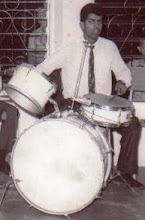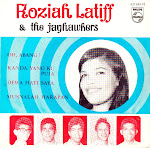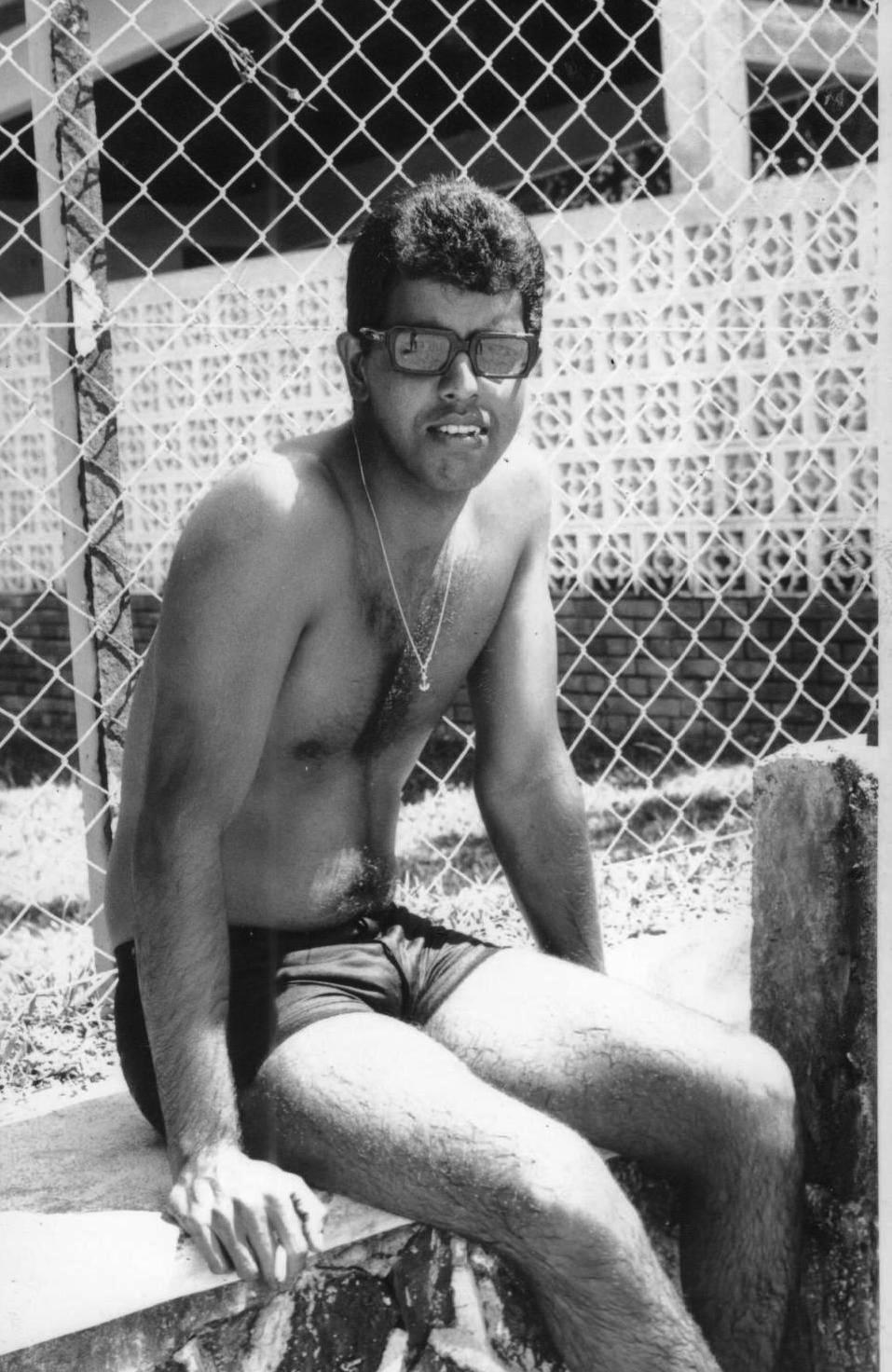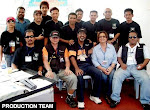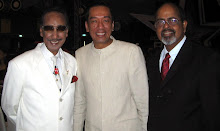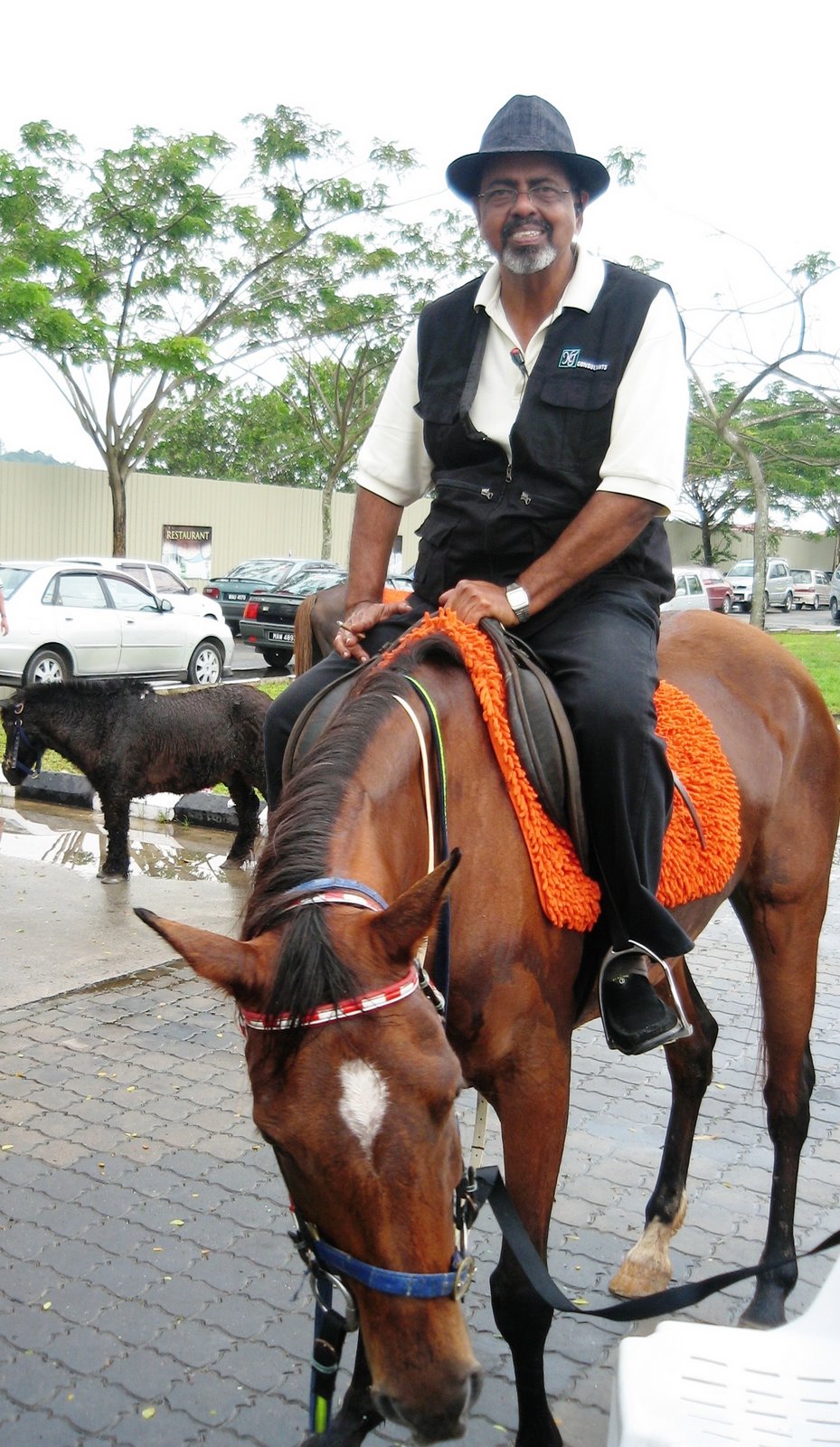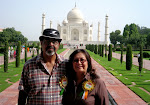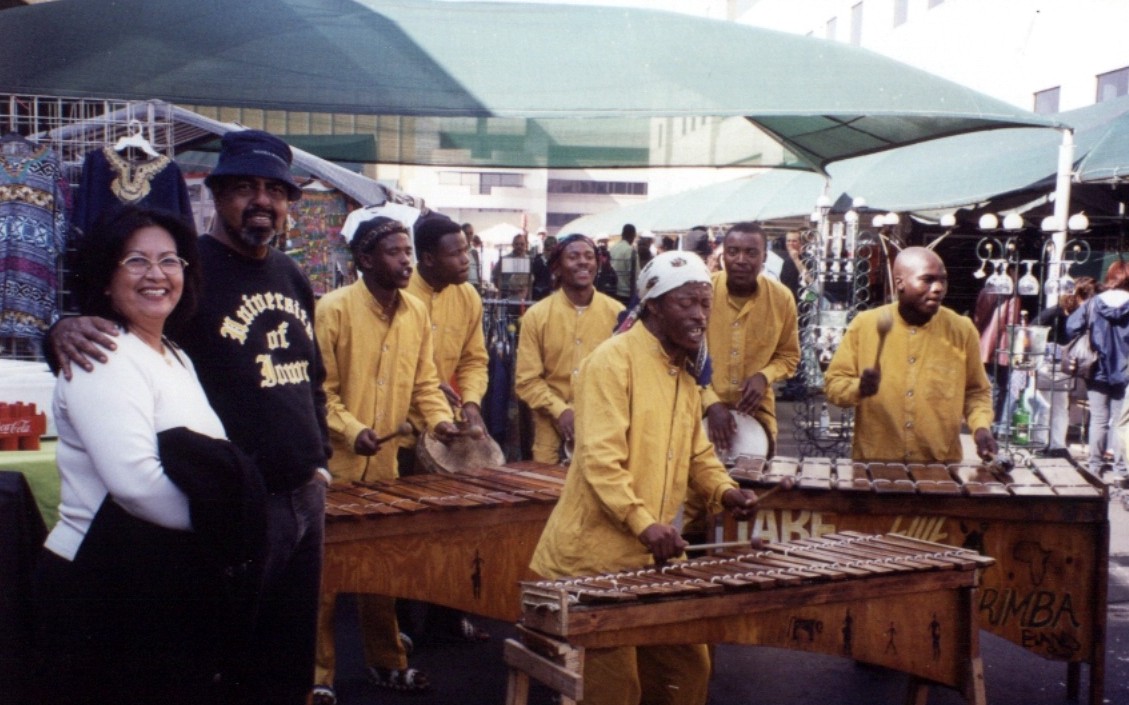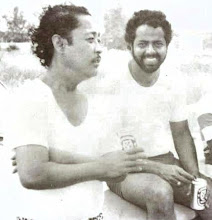

The earliest denizens of the Malay archipelago in recorded history were Malays and have been categorized as either orang darat (land-people) or those who lived in river-fronts or by the sea in huts on stilts as orang laut (sea- people).
These earliest natives had nothing much of a civilization to show of course. The word Malay is itself a possible corruption of the Indian Malaiyur which has two possible meanings in Tamil. The earliest foreigners who arrived here were Indians who most probably also gave the name Malaiiyur to refer to peninsular Malaya which has a mountainous main range running from north to south like a backbone. It therefore can mean "land of mountains". Malai also refers to rain and therefore " land of rain" depending on the emphasis and this also seems applicable here. The word Melayu with the "r" dropped is definitely closer to the original than the one altered as "Malay" in English. The English have done this sort of name alterations all over the world and have a propensity for it. The Canary Islands is one good example. In Spanish it was originally known as La Islas Canarias (meaning Island of Dogs) and had nothing to do with canary birds at all. Even the name of great prophet of Christianity and Islam Isa/Esu was changed to Jesus but I think the "credit" for this should go St. paul for Romanizing the name of this mighty prophet.
The point to stress here is that Malays were already here when the earliest Indians arrived in the 1st century AD. It would be just as pointless to dispute that the native Indians of the Americas had migrated from other places such as North Asia, Europe or even Australia and are therefore, not the true natives. Natives find such findings or assertion offensive as they believe that their ancestors have always lived where they now live. In a similar vein modern Malays too would prefer to think along the same lines even if their forefathers had "migrated" over to East or West Malaysia from other parts of the "Malay Archipelago" of which it was a part of. Such migrations took place during earlier times of border-less societies or with very porous boundaries.
The logic of evolution as well as the laws of permutation simply dictate that humankind must have begun from a single pair whether you believe in Adam and Eve or Darwinian theories or even if you are a free thinker. Human history has always been one full of constant migration. No one can dispute this without sounding ill-informed. It has not ended nor will it ever end till Judgement Day.
The American natives, for example, have just withered away or assimilated into the hordes of migrant races that came over in predatory fashion onto their lands and who now all call themselves Americans, the natives included. Australia still has its fair share of natives intact but they are not at all in control of the affairs taking place in that continent as a definitive race. While the Malaysian Malays politically referred to as “bumiputra” (sons of the soil) they have coined another special term for the aborigines – “pri-bumis” to differentiate themselves from the aborigines who themselves have sub-divisions. This can indirectly be interpreted, by inference, as an open admission that the aborigines were here earlier and therefore, are the true natives of Malaysia. It could also be that they consider themselves more cultured, hence the distinction in terms.
But much unlike the aborigines, the modern Malays, if I may hypothesize, are still evolving as a race. The version that is generally accepted and politically correct is in the Malaysian constitution itself where it is stated that you are Malay if you are Muslim citizen who habitually leads a “Malay” way of life. Now this means that even I, though of purely South Indian Dravidian stock am considered a Malay constitutionally. Therefore, being a Malay today in Malaysia is more of a socio-religious and legalistic definition and is not one based on ethnicity alone. If we go strictly by ethnic considerations combined with this constitutional definition, then the present day Malaysian Malay citizen has be a "rojak" (mishmash) of one or more of the following ethnic varieties – aborigine, Chinese, Indian, Arab, European and what not so long as he/she is also a Muslim.
This, in a sense, can also alienate non-Muslim natives who are Christians or animists from being considered Malays and thus justifying the coining of the bumiputra and pribumi labels. Therefore, Malays can have Dravidian, Indo-Aryan, Semitic, Hispanic, Mongoloid or aboriginal looks and features that can lead to untraceable parentage or ancestry. Perhaps that is why some people have even gone on to state that, strictly speaking, there is no such race as Malay. Whatever said and done, this unique mix has come to represent the Malaysian Malay today.
Almost all true natives worldwide share many commonalities - in this case, in the Malay Peninsula and North Borneo. Such peoples had always been close to nature and led very simplistic lives. They had also always demonstrated their characteristic hospitality to any foreigner. There are even tales of Eskimos offering their wives to foreigners in what can be considered the ultimate in such hospitality behaviour. Foreigners visiting native lands were usually more advanced in knowledge and technology and had traveled far and wide mainly because of their significantly more advanced knowledge in just about everything including seafaring and astronomy.
This was the case with the Chinese, Indians, Arabs and later on the Europeans who came to this geographical area. These foreigners also possessed superior weaponry with which they subdued the natives easily if and whenever it became necessary. The innocent warmth and hospitality that had been exhibited by natives elsewhere too in Africa, North and South Americas, Polynesia, Melanesia and Australasia and are well documented by the early travelers and discoverers. It is also a trait that has been well exploited by true migrants everywhere. The earliest denizens of the Malay Archipelago had been no different and had welcomed an assortment of foreigners over the centuries. Strangely though, I have yet to come across reports of such innocent warmth and hospitality to have been exhibited by the natives of Europe (whom many admire today for their civility) such as the Vikings, the Celts, the Huns,the Mongols and the Goths who have been, instead, all referred to in no uncertain terms as barbarians in history books written by none other than their own descendants.
Migrant peoples generally end up with pejorative feelings or notions towards natives most of the time. Malaysia would probably be no exception in this matter too. Few can be flattering such as an early English definition of the Malay as “nature’s gentleman”. One M. Bakri Musa in an article “Melayu Baru Versus Melayu Barua” in his blog at http://baldimerah.blogspot.com/2006/08/melayu-baru-vs-melayu-barua.html) has this to say. “The colonials used to refer to Malays as “nature’s gentlemen,” a term of endearment as well as condescension”. The early Malays were definitely a gentle people. But the colonials had also dubbed these simple Malays, as well as natives in other lands, as being lazy and indolent. This sort of ethnocentric views are again well documented.
The late Dr. Syed Hussein-al- Atas, a former Vice Chancellor of The University of Malaya and renowned Malaysian academic wrote his Myth of the Lazy Native to counter what he considered derogatory views of particularly the Malays. Syed Hussein began pondering the question of why Western colonialists had, for four centuries, considered the natives of the Malay Archipelago to be generally lazy, since Europeans had not arrived until the 16th century. I am not sure whether the earlier Indians, Arabs and Chinese had ever conferred such derogatory labels on the early Malays or even on others elsewhere. In the book, he cited one instance of such "denigrating" views of the natives, when a German scientist suggested that Filipinos made their oars from bamboo so they could rest more frequently: "If they happen to break, so much the better, for the fatiguing labour of rowing must necessarily be suspended till they are mended again."
Syed Hussein criticized such beliefs in the book as ranging from vulgar fantasy and untruth to unrefined scholarship. He also asserted that "the image of the indolent, dull, backward and treacherous native has changed into that of a dependent one requiring assistance to climb the ladder of progress". It is worth noting that Dr. Syed Hussein-al- Atas himself was born in Bogor Indonesia and his parents were from Hadhramaut (Yemen) in the Arabian Peninsula. Although clearly an Indonesian Arab who migrated over to Malaysia, he was considered and accepted as a Malay patriot. He too possibly considered himself Malay as he was clearly upset by such pejorative views of the Malays and wrote at length to counteract them.
I believe that most people who ventured out from their homelands to seek fortunes elsewhere like what the Europeans did during their voyages of discovery had their own interpretation of what being lazy or hardworking meant. Malays had worked submerged to the waist in a muddy paddy field under the blistering sun from morning till sunset but this sort of efforts was hardly seen as industrious behaviour. One can still see such “industrious” Malay behavior particularly during the Muslim fasting month where petty Malay traders toil away in the hot afternoons at their food stalls frying noodles or bananas in the torturing heat just to “cari makan” (earn a living). But this does not seem to count as industry even by some of their fellow non-Malay Malaysians.
The early but "distant" migrants to Malaysia that is, the Indians and the Chinese, mostly came from countries that were plagued with starvation, political unrest, natural disasters or just monstrous populations. Malaysia is a blessed land with almost no natural disasters such as famine, drought, volcanoes, hurricanes, cyclones and typhoons. Even Sumatra’s land mass protects peninsular Malaysia to a large extent from the full impact of a tsunami. One has just to stick a stick into the ground and it grows and bears fruit even without any attendant gardening or farming expertise. People with such a simple and blessed background in a bountiful land are therefore more easily satiated with life. This leads to a simpler and more relaxed lifestyle that has been perceived as “lazy and indolent” by others. Some have even labeled it as a hedonistic way of living.
It must be stated here that the Europeans or their overseas American cousins, by stark contrast, had survived the Industrial Revolution, plagues, famines and numerous never ending wars of greed and jealousy. The infamous Hundred Years War which was a conflict between France and England, lasting 116 years from 1337 to 1453 is a prime example. It was also the West that developed and used nuclear bombs in a war. Similarly, equally senseless wars had also been fought by other non- Europeans such as the Egyptians, Greeks, Romans, Indians, Moguls, Chinese, Japanese, Arabs, Persians, Mongols and Russians.
But natives worldwide, generally speaking of course, do not have such harsh backgrounds. At the most they might have experienced brief periods of turmoil or other milder tribulations in their much simpler lives. They mainly lived in peace with themselves and nature. The Europeans and others who visited the Malay lands found it easy therefore to just label the Malays as being plain lazy and indolent. This sort of labeling bothers all those who consider themselves Malays till today and rightfully so. It is not easy for one to go about living knowing fully well that foreigners including their non-Malay friends, colleagues and neighbors harbor such misplaced notions but do not say it directly into their face.
The British saw much potential in Malaya and wanted to transform it into a world leader in rubber production and tin. Their vision could not materialize if they worked with the native Malays as they were quite happy and contended with their simple ways and living in kampongs and riversides. The Malays had therefore been considered lazy and indolent and branded as "handicapped" compared to the early Chinese and Indian migrants from day one by the British. The British were fully aware that they could expect full industry from the early Indian and Chinese migrants. Thus the British encouraged them over. The majority of these early migrants were poverty and hunger stricken in India and China. Such Indians and Chinese migrants were then exploited to the hilt. Thanks to the free hand afforded by the Malay rulers themselves, the British encouraged and allowed whole scale Indian and Chinese immigration until at one time the non-Malay population of the Federated Malay States exceeded that of the Malays in the 1950’s.
Quite unbothered, the British kept this open door migration policy as they wanted to and succeeded in making Malaya the world leader in tin and rubber production albeit initially for their own gain. They succeeded in doing this within a relatively very short period of time. They had seen the commercial potential and fully exploited it to the hilt and subsequently profited much from their vision and foresight. The British vision for Malaya was similar but on a very much grander scale compared to that of the late Malaysian tycoon Lim Goh Thong and his vision of developing Genting into what it is today. Such visions do not seem to come to us common people.
As an aside in this matter, it would be fair comment that the Malay, Chinese and Indian youth of today are exhibiting less of their forefathers' work attitudes simply because they are having a much more cushy life today. Perhaps that is why we are having hordes of a new wave of immigrants such as Indonesians, Bangladeshis, Thais, Nepalese, Burmese and what not to do all our menial and dirty jobs. Thus can we say that all Malaysians are lazy and indolent today as the British had described the Malays in earlier times? In fact British youth too can, in a similar vein, be said to lazy and indolent today. The same is also true in USA. Some say the laziness and indolence among the youth of today is a worldwide problem particularly in developed and also developing countries.
Long before Malayan independence in 1957 especially after World War II, the British realized that they would have to pack and leave the region one day not too far away. To ensure that the Malays survived well after their departure they had set up quite a few affirmative action institutions like the Rural Industry Development Authority (RIDA), The Malay Administrative Service (MAS) as well as elite Malay educational institutions and a predominantly Malay military and police force to protect the Malays from what Tun Dr. Mahatir termed as “the predatory migrants” in his book “The Malay Dilemma”. They even had federal and state minor scholarship for poor Malay school children from rural areas long before Merdeka. The present day Ketuanan Melayu (Malay over-lordship) and the affirmative action policies exist purely because of these early designs hatched by the British themselves before they left. This also explains why there have never been non-Malay Distict Officers(DO's) till today or too many non-Malays in the Malaysian Civil Service.
The Wikipedia says:
“The one consolation to Malay pride was that the British allowed them a virtual monopoly of positions in the police and local military units, as well as a majority of those administrative positions open to non-Europeans. While the Chinese mostly built and paid for their own schools and colleges, importing teachers from China, the colonial government fostered education for Malays, opening Malay College in 1905and creating the Malay Administrative Service in 1910. (The college was dubbed “Bab ud-Darajat” – the Gateway to High Rank.) A Malay Teachers College (now Universiti Pendidikan Sultan Idris) followed in 1922, and a Malay Women’s Training College(now the Institut Perguruan Perempuan in Melaka) in 1935. All this reflected the official British policy that Malaya belonged to the Malays, and that the other races were but temporary residents. This view was increasingly out of line with reality, and contained the seeds of much future trouble in Malaysia."
Their final gesture was to draw up the Malayan (and Malaysian later) constitution together with parliamentary and state constituencies allocation in such a manner that totally favored Malay rule. To be somewhat fair to the Indians and Chinese whom they had encouraged to come over, the British did make allowances for their full citizenship as well as their rights to practice non-Muslim religions and learn their respective mother tongues before leaving. This is often referred to as the social contract that was agreed upon by the Malays, Chinese and Indians during the Merdeka talks with British blessing of course. These days, many Malaysians are simply unaware of such things.
The British design has worked out quite successfully and has not only determined Malay superiority in civil management, politics, the military and the police but also enabled Malaysia to be what it is today - a striking model of peace, progress and prosperity compared to almost all the former European colonies worldwide. They had also left behind a good civil legacy and model to build upon. No other former British or other European colony can boast of a similar situation except perhaps Singapore. But then it was also a part of Malaya and Malaysia and shares a common history. The discovery of petroleum in the post-Merdeka period too has also helped quite a bit I must add for Malaysia's prosperity today.
It is also my contention here that the average Malay generally suffers from low self esteem as Tun Dr. Mahatir had once observed. It can also be labeled as a form of inferiority complex. Almost all Malays know deep down that everyone from foreigners to their average fellow non-Malay citizens in Malaysia (then and now) have always looked down upon them. According to the Wikipedia, “An inferiority complex, in the fields of psychology and psychoanalysis, is a feeling that one is inferior to others in some way. Such feelings can arise from an imagined or actual inferiority in the afflicted person. It is often subconscious, and is thought to drive afflicted individuals to overcompensate, resulting either in spectacular achievement or extreme antisocial behavior, or both.
Unlike a normal feeling of inferiority, which can act as an incentive for achievement, an inferiority complex is an advanced state of discouragement, often resulting in a retreat from difficulties.” Modern Malays, especially the more politically charged ones, seem to be afflicted with this sort of negative inferiority complex today to a greater extent. They are quick to blame everyone for their perceived misfortunes and truly believe that the world owes them a living. They have even generated hate towards the very same colonial "saviors" who ironically had created avenues and institutions to ensure that the Malays stayed in power indefinitely and not be "devoured" by the non-Malays.
Perhaps this sort of negative inferiority complex can also help explain many problems that the Malays face today. Social problems amongst the Malays in Malaysia has reached alarming levels such as drug abuse, "deviant" Christian and Islamic sects, broken homes, single mothers, wayward children and even the Mat Rempits (illegal bike racers) menace. The government has propagated the variant forms of "Malaysia Boleh" campaigns essentially designed to bolster the faltering Malay ego although the official reason is portrayed as a move to brand Malaysia worldwide.
Many national projects like dropping the national Proton car over the North Pole, climbing Mt. Everest, sailing solo round the world, building mega structures and the more recent Angkasawan project are, I believe, true manifestations of this same type of inferiority complex. Malaysians also indulge in similar but smaller scale somewhat crazy activities like baking the biggest cake, stitching the longest flag etc. to prove something to the world out there. If the Guinness Book of Records was uninterested we created our very own Malaysia Book of Records to accommodate such feats.
This is again a clear indication of the same inferiority complex and akin to the Napoleon complex (also known as Napoleon syndrome or Small Man syndrome) which is a more colloquial but a pejorative term used to describe a type of inferiority complex which is said to affect and afflict people who are short. The term is also used more generally to describe people who are driven by a perceived handicap to overcompensate in other aspects of their lives. People like Napoleon and Hitler are prominent examples who have left indelible marks in human history. In Malaysia, our own Dr. Mahatir can be considered a counterpart of sorts but in a lot more positive way in branding Malaysia. Having the pre-dominantly Chinese controlled Singapore, formerly a Malaysian state, as a commercially successful neighbor does not help either. Malaysians look upon Singapore like a Don Quixotian "dragon" to be slain.
So there we have it all in a nutshell – my understanding of the Malaysian Malay psyche of today. The simple and humble ways of the earlier native Malays are almost all gone into extinction like the dodo due to increasing modernization and its attendant economic greed. We do see traces and semblances of the original humble traits of Malays surface occasionally during festivals and in our daily concourses with ordinary Malays, especially in the rural areas and even in some of the rural-minded ones living in the towns. But in recent times, the uglier side of the Malay seems to be slowly but surely replacing the simpler, humbler, more apologetic and nicer side of our “nature’s gentleman”. I see it more as a normal primordial and natural "getting territorial" reaction
The escalating race based politics in Malaysia too is not helping much in the direction of meaningful social integration and understanding. In his Presidential address at the UMNO General Assembly of 2007 the Malaysian Prime Minister Dato Seri Abdullah Badawi had this to say of the modern Malay psyche. “Malays in the modern day are prepared to work hard. Many are prepared to compete globally.” Such changes are already apparent in the general Malay mindset although the majority of Malays are yet to be so inclined. Only time will tell. At this same assembly he had also mentioned that issues must be addressed on the basis of the interests of the nation and the Malaysian people as a whole.
But he himself should set the example first by talking more as a Malaysian and not as a Malay then. Perhaps he could start by changing the nature of the Malay based United Malay National Organization(UMNO)to a multi-racial one by renaming it United Malaysian National Organization and absorb all the other racial and non-racial political parties into this new umbrella organization and still call it UMNO. This, incidentally, was the vision of the founder of UMNO Dato Onn Jaafar in 1946. Perhaps its time for his vision to materialize now after all these years of racial politicking and bickering. Let us wait and hope for the best for such aspirations to materialize. I still do not see the light at the end of the tunnel yet.
In the ultimate analysis, we would all be a lot better off if we could only think of ourselves as mere humans, a single race, complete with all our human frailties and weaknesses without being so ethnocentrically motivated to label or stereotype others in any manner. If only all Malaysians, Malays included, can understand the predicament of the Malays in general, it will definitely help to foster better race relations. By the way, for those of you who think Malays are lazy and indolent, I for one have seen my fair share of equally lazy and indolent people - Americans, Europeans, Indians and Chinese included in my thirty six years of teaching experience and sixty eight years of human existence.
Written by:
Johami Abdullah @ Joe Chelliah
The logic of evolution as well as the laws of permutation simply dictate that humankind must have begun from a single pair whether you believe in Adam and Eve or Darwinian theories or even if you are a free thinker. Human history has always been one full of constant migration. No one can dispute this without sounding ill-informed. It has not ended nor will it ever end till Judgement Day.
The American natives, for example, have just withered away or assimilated into the hordes of migrant races that came over in predatory fashion onto their lands and who now all call themselves Americans, the natives included. Australia still has its fair share of natives intact but they are not at all in control of the affairs taking place in that continent as a definitive race. While the Malaysian Malays politically referred to as “bumiputra” (sons of the soil) they have coined another special term for the aborigines – “pri-bumis” to differentiate themselves from the aborigines who themselves have sub-divisions. This can indirectly be interpreted, by inference, as an open admission that the aborigines were here earlier and therefore, are the true natives of Malaysia. It could also be that they consider themselves more cultured, hence the distinction in terms.
But much unlike the aborigines, the modern Malays, if I may hypothesize, are still evolving as a race. The version that is generally accepted and politically correct is in the Malaysian constitution itself where it is stated that you are Malay if you are Muslim citizen who habitually leads a “Malay” way of life. Now this means that even I, though of purely South Indian Dravidian stock am considered a Malay constitutionally. Therefore, being a Malay today in Malaysia is more of a socio-religious and legalistic definition and is not one based on ethnicity alone. If we go strictly by ethnic considerations combined with this constitutional definition, then the present day Malaysian Malay citizen has be a "rojak" (mishmash) of one or more of the following ethnic varieties – aborigine, Chinese, Indian, Arab, European and what not so long as he/she is also a Muslim.
This, in a sense, can also alienate non-Muslim natives who are Christians or animists from being considered Malays and thus justifying the coining of the bumiputra and pribumi labels. Therefore, Malays can have Dravidian, Indo-Aryan, Semitic, Hispanic, Mongoloid or aboriginal looks and features that can lead to untraceable parentage or ancestry. Perhaps that is why some people have even gone on to state that, strictly speaking, there is no such race as Malay. Whatever said and done, this unique mix has come to represent the Malaysian Malay today.
Almost all true natives worldwide share many commonalities - in this case, in the Malay Peninsula and North Borneo. Such peoples had always been close to nature and led very simplistic lives. They had also always demonstrated their characteristic hospitality to any foreigner. There are even tales of Eskimos offering their wives to foreigners in what can be considered the ultimate in such hospitality behaviour. Foreigners visiting native lands were usually more advanced in knowledge and technology and had traveled far and wide mainly because of their significantly more advanced knowledge in just about everything including seafaring and astronomy.
This was the case with the Chinese, Indians, Arabs and later on the Europeans who came to this geographical area. These foreigners also possessed superior weaponry with which they subdued the natives easily if and whenever it became necessary. The innocent warmth and hospitality that had been exhibited by natives elsewhere too in Africa, North and South Americas, Polynesia, Melanesia and Australasia and are well documented by the early travelers and discoverers. It is also a trait that has been well exploited by true migrants everywhere. The earliest denizens of the Malay Archipelago had been no different and had welcomed an assortment of foreigners over the centuries. Strangely though, I have yet to come across reports of such innocent warmth and hospitality to have been exhibited by the natives of Europe (whom many admire today for their civility) such as the Vikings, the Celts, the Huns,the Mongols and the Goths who have been, instead, all referred to in no uncertain terms as barbarians in history books written by none other than their own descendants.
Migrant peoples generally end up with pejorative feelings or notions towards natives most of the time. Malaysia would probably be no exception in this matter too. Few can be flattering such as an early English definition of the Malay as “nature’s gentleman”. One M. Bakri Musa in an article “Melayu Baru Versus Melayu Barua” in his blog at http://baldimerah.blogspot.com/2006/08/melayu-baru-vs-melayu-barua.html) has this to say. “The colonials used to refer to Malays as “nature’s gentlemen,” a term of endearment as well as condescension”. The early Malays were definitely a gentle people. But the colonials had also dubbed these simple Malays, as well as natives in other lands, as being lazy and indolent. This sort of ethnocentric views are again well documented.
The late Dr. Syed Hussein-al- Atas, a former Vice Chancellor of The University of Malaya and renowned Malaysian academic wrote his Myth of the Lazy Native to counter what he considered derogatory views of particularly the Malays. Syed Hussein began pondering the question of why Western colonialists had, for four centuries, considered the natives of the Malay Archipelago to be generally lazy, since Europeans had not arrived until the 16th century. I am not sure whether the earlier Indians, Arabs and Chinese had ever conferred such derogatory labels on the early Malays or even on others elsewhere. In the book, he cited one instance of such "denigrating" views of the natives, when a German scientist suggested that Filipinos made their oars from bamboo so they could rest more frequently: "If they happen to break, so much the better, for the fatiguing labour of rowing must necessarily be suspended till they are mended again."
Syed Hussein criticized such beliefs in the book as ranging from vulgar fantasy and untruth to unrefined scholarship. He also asserted that "the image of the indolent, dull, backward and treacherous native has changed into that of a dependent one requiring assistance to climb the ladder of progress". It is worth noting that Dr. Syed Hussein-al- Atas himself was born in Bogor Indonesia and his parents were from Hadhramaut (Yemen) in the Arabian Peninsula. Although clearly an Indonesian Arab who migrated over to Malaysia, he was considered and accepted as a Malay patriot. He too possibly considered himself Malay as he was clearly upset by such pejorative views of the Malays and wrote at length to counteract them.
I believe that most people who ventured out from their homelands to seek fortunes elsewhere like what the Europeans did during their voyages of discovery had their own interpretation of what being lazy or hardworking meant. Malays had worked submerged to the waist in a muddy paddy field under the blistering sun from morning till sunset but this sort of efforts was hardly seen as industrious behaviour. One can still see such “industrious” Malay behavior particularly during the Muslim fasting month where petty Malay traders toil away in the hot afternoons at their food stalls frying noodles or bananas in the torturing heat just to “cari makan” (earn a living). But this does not seem to count as industry even by some of their fellow non-Malay Malaysians.
The early but "distant" migrants to Malaysia that is, the Indians and the Chinese, mostly came from countries that were plagued with starvation, political unrest, natural disasters or just monstrous populations. Malaysia is a blessed land with almost no natural disasters such as famine, drought, volcanoes, hurricanes, cyclones and typhoons. Even Sumatra’s land mass protects peninsular Malaysia to a large extent from the full impact of a tsunami. One has just to stick a stick into the ground and it grows and bears fruit even without any attendant gardening or farming expertise. People with such a simple and blessed background in a bountiful land are therefore more easily satiated with life. This leads to a simpler and more relaxed lifestyle that has been perceived as “lazy and indolent” by others. Some have even labeled it as a hedonistic way of living.
It must be stated here that the Europeans or their overseas American cousins, by stark contrast, had survived the Industrial Revolution, plagues, famines and numerous never ending wars of greed and jealousy. The infamous Hundred Years War which was a conflict between France and England, lasting 116 years from 1337 to 1453 is a prime example. It was also the West that developed and used nuclear bombs in a war. Similarly, equally senseless wars had also been fought by other non- Europeans such as the Egyptians, Greeks, Romans, Indians, Moguls, Chinese, Japanese, Arabs, Persians, Mongols and Russians.
But natives worldwide, generally speaking of course, do not have such harsh backgrounds. At the most they might have experienced brief periods of turmoil or other milder tribulations in their much simpler lives. They mainly lived in peace with themselves and nature. The Europeans and others who visited the Malay lands found it easy therefore to just label the Malays as being plain lazy and indolent. This sort of labeling bothers all those who consider themselves Malays till today and rightfully so. It is not easy for one to go about living knowing fully well that foreigners including their non-Malay friends, colleagues and neighbors harbor such misplaced notions but do not say it directly into their face.
The British saw much potential in Malaya and wanted to transform it into a world leader in rubber production and tin. Their vision could not materialize if they worked with the native Malays as they were quite happy and contended with their simple ways and living in kampongs and riversides. The Malays had therefore been considered lazy and indolent and branded as "handicapped" compared to the early Chinese and Indian migrants from day one by the British. The British were fully aware that they could expect full industry from the early Indian and Chinese migrants. Thus the British encouraged them over. The majority of these early migrants were poverty and hunger stricken in India and China. Such Indians and Chinese migrants were then exploited to the hilt. Thanks to the free hand afforded by the Malay rulers themselves, the British encouraged and allowed whole scale Indian and Chinese immigration until at one time the non-Malay population of the Federated Malay States exceeded that of the Malays in the 1950’s.
Quite unbothered, the British kept this open door migration policy as they wanted to and succeeded in making Malaya the world leader in tin and rubber production albeit initially for their own gain. They succeeded in doing this within a relatively very short period of time. They had seen the commercial potential and fully exploited it to the hilt and subsequently profited much from their vision and foresight. The British vision for Malaya was similar but on a very much grander scale compared to that of the late Malaysian tycoon Lim Goh Thong and his vision of developing Genting into what it is today. Such visions do not seem to come to us common people.
As an aside in this matter, it would be fair comment that the Malay, Chinese and Indian youth of today are exhibiting less of their forefathers' work attitudes simply because they are having a much more cushy life today. Perhaps that is why we are having hordes of a new wave of immigrants such as Indonesians, Bangladeshis, Thais, Nepalese, Burmese and what not to do all our menial and dirty jobs. Thus can we say that all Malaysians are lazy and indolent today as the British had described the Malays in earlier times? In fact British youth too can, in a similar vein, be said to lazy and indolent today. The same is also true in USA. Some say the laziness and indolence among the youth of today is a worldwide problem particularly in developed and also developing countries.
Long before Malayan independence in 1957 especially after World War II, the British realized that they would have to pack and leave the region one day not too far away. To ensure that the Malays survived well after their departure they had set up quite a few affirmative action institutions like the Rural Industry Development Authority (RIDA), The Malay Administrative Service (MAS) as well as elite Malay educational institutions and a predominantly Malay military and police force to protect the Malays from what Tun Dr. Mahatir termed as “the predatory migrants” in his book “The Malay Dilemma”. They even had federal and state minor scholarship for poor Malay school children from rural areas long before Merdeka. The present day Ketuanan Melayu (Malay over-lordship) and the affirmative action policies exist purely because of these early designs hatched by the British themselves before they left. This also explains why there have never been non-Malay Distict Officers(DO's) till today or too many non-Malays in the Malaysian Civil Service.
The Wikipedia says:
“The one consolation to Malay pride was that the British allowed them a virtual monopoly of positions in the police and local military units, as well as a majority of those administrative positions open to non-Europeans. While the Chinese mostly built and paid for their own schools and colleges, importing teachers from China, the colonial government fostered education for Malays, opening Malay College in 1905and creating the Malay Administrative Service in 1910. (The college was dubbed “Bab ud-Darajat” – the Gateway to High Rank.) A Malay Teachers College (now Universiti Pendidikan Sultan Idris) followed in 1922, and a Malay Women’s Training College(now the Institut Perguruan Perempuan in Melaka) in 1935. All this reflected the official British policy that Malaya belonged to the Malays, and that the other races were but temporary residents. This view was increasingly out of line with reality, and contained the seeds of much future trouble in Malaysia."
Their final gesture was to draw up the Malayan (and Malaysian later) constitution together with parliamentary and state constituencies allocation in such a manner that totally favored Malay rule. To be somewhat fair to the Indians and Chinese whom they had encouraged to come over, the British did make allowances for their full citizenship as well as their rights to practice non-Muslim religions and learn their respective mother tongues before leaving. This is often referred to as the social contract that was agreed upon by the Malays, Chinese and Indians during the Merdeka talks with British blessing of course. These days, many Malaysians are simply unaware of such things.
The British design has worked out quite successfully and has not only determined Malay superiority in civil management, politics, the military and the police but also enabled Malaysia to be what it is today - a striking model of peace, progress and prosperity compared to almost all the former European colonies worldwide. They had also left behind a good civil legacy and model to build upon. No other former British or other European colony can boast of a similar situation except perhaps Singapore. But then it was also a part of Malaya and Malaysia and shares a common history. The discovery of petroleum in the post-Merdeka period too has also helped quite a bit I must add for Malaysia's prosperity today.
It is also my contention here that the average Malay generally suffers from low self esteem as Tun Dr. Mahatir had once observed. It can also be labeled as a form of inferiority complex. Almost all Malays know deep down that everyone from foreigners to their average fellow non-Malay citizens in Malaysia (then and now) have always looked down upon them. According to the Wikipedia, “An inferiority complex, in the fields of psychology and psychoanalysis, is a feeling that one is inferior to others in some way. Such feelings can arise from an imagined or actual inferiority in the afflicted person. It is often subconscious, and is thought to drive afflicted individuals to overcompensate, resulting either in spectacular achievement or extreme antisocial behavior, or both.
Unlike a normal feeling of inferiority, which can act as an incentive for achievement, an inferiority complex is an advanced state of discouragement, often resulting in a retreat from difficulties.” Modern Malays, especially the more politically charged ones, seem to be afflicted with this sort of negative inferiority complex today to a greater extent. They are quick to blame everyone for their perceived misfortunes and truly believe that the world owes them a living. They have even generated hate towards the very same colonial "saviors" who ironically had created avenues and institutions to ensure that the Malays stayed in power indefinitely and not be "devoured" by the non-Malays.
Perhaps this sort of negative inferiority complex can also help explain many problems that the Malays face today. Social problems amongst the Malays in Malaysia has reached alarming levels such as drug abuse, "deviant" Christian and Islamic sects, broken homes, single mothers, wayward children and even the Mat Rempits (illegal bike racers) menace. The government has propagated the variant forms of "Malaysia Boleh" campaigns essentially designed to bolster the faltering Malay ego although the official reason is portrayed as a move to brand Malaysia worldwide.
Many national projects like dropping the national Proton car over the North Pole, climbing Mt. Everest, sailing solo round the world, building mega structures and the more recent Angkasawan project are, I believe, true manifestations of this same type of inferiority complex. Malaysians also indulge in similar but smaller scale somewhat crazy activities like baking the biggest cake, stitching the longest flag etc. to prove something to the world out there. If the Guinness Book of Records was uninterested we created our very own Malaysia Book of Records to accommodate such feats.
This is again a clear indication of the same inferiority complex and akin to the Napoleon complex (also known as Napoleon syndrome or Small Man syndrome) which is a more colloquial but a pejorative term used to describe a type of inferiority complex which is said to affect and afflict people who are short. The term is also used more generally to describe people who are driven by a perceived handicap to overcompensate in other aspects of their lives. People like Napoleon and Hitler are prominent examples who have left indelible marks in human history. In Malaysia, our own Dr. Mahatir can be considered a counterpart of sorts but in a lot more positive way in branding Malaysia. Having the pre-dominantly Chinese controlled Singapore, formerly a Malaysian state, as a commercially successful neighbor does not help either. Malaysians look upon Singapore like a Don Quixotian "dragon" to be slain.
So there we have it all in a nutshell – my understanding of the Malaysian Malay psyche of today. The simple and humble ways of the earlier native Malays are almost all gone into extinction like the dodo due to increasing modernization and its attendant economic greed. We do see traces and semblances of the original humble traits of Malays surface occasionally during festivals and in our daily concourses with ordinary Malays, especially in the rural areas and even in some of the rural-minded ones living in the towns. But in recent times, the uglier side of the Malay seems to be slowly but surely replacing the simpler, humbler, more apologetic and nicer side of our “nature’s gentleman”. I see it more as a normal primordial and natural "getting territorial" reaction
The escalating race based politics in Malaysia too is not helping much in the direction of meaningful social integration and understanding. In his Presidential address at the UMNO General Assembly of 2007 the Malaysian Prime Minister Dato Seri Abdullah Badawi had this to say of the modern Malay psyche. “Malays in the modern day are prepared to work hard. Many are prepared to compete globally.” Such changes are already apparent in the general Malay mindset although the majority of Malays are yet to be so inclined. Only time will tell. At this same assembly he had also mentioned that issues must be addressed on the basis of the interests of the nation and the Malaysian people as a whole.
But he himself should set the example first by talking more as a Malaysian and not as a Malay then. Perhaps he could start by changing the nature of the Malay based United Malay National Organization(UMNO)to a multi-racial one by renaming it United Malaysian National Organization and absorb all the other racial and non-racial political parties into this new umbrella organization and still call it UMNO. This, incidentally, was the vision of the founder of UMNO Dato Onn Jaafar in 1946. Perhaps its time for his vision to materialize now after all these years of racial politicking and bickering. Let us wait and hope for the best for such aspirations to materialize. I still do not see the light at the end of the tunnel yet.
In the ultimate analysis, we would all be a lot better off if we could only think of ourselves as mere humans, a single race, complete with all our human frailties and weaknesses without being so ethnocentrically motivated to label or stereotype others in any manner. If only all Malaysians, Malays included, can understand the predicament of the Malays in general, it will definitely help to foster better race relations. By the way, for those of you who think Malays are lazy and indolent, I for one have seen my fair share of equally lazy and indolent people - Americans, Europeans, Indians and Chinese included in my thirty six years of teaching experience and sixty eight years of human existence.
Written by:
Johami Abdullah @ Joe Chelliah


.jpg)



